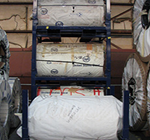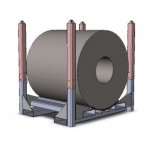The Impact of Warehouse Storage on Supply Chain Management
Warehouse storage refers to the physical space where goods are stored before they are distributed or sold. It is an essential part of the supply chain as it enables businesses to manage their inventory and ensure that products are available when needed. Effective warehouse storage involves optimizing the use of space, ensuring that products are stored safely & securely, and minimizing the time and effort required to move goods in and out of the warehouse.
Warehouse storage plays a critical role in supply chain management as it impacts various aspects of the supply chain. Efficient warehouse storage can help in improving inventory management, fulfillment and distribution, cost reduction and customer satisfaction. For instance, it can lead to better storage capacity and utilization, efficient handling and movement of inventory and faster delivery times. However, there are also challenges associated with warehouse storage which includes capacity constraints, labor & environmental factors. To optimize warehouse storage, strategies such as inventory optimization, technology integration and process improvement can be employed.

Challenges in Warehouse Storage
Capacity Constraints: One of the main challenges in warehouse storage is limited space and storage capacity. Warehouses need to make the most of the available space to accommodate inventory while ensuring accessibility and safety.
Inventory Management: Effective inventory management is essential for warehouse storage, but it can be challenging to achieve. Issues such as overstocking, stockouts and inaccurate inventory records can all lead to inefficiencies and increased costs.
Labor: Warehouses require a significant amount of labor, and finding and retaining skilled workers can be a challenge. Additionally, physical demands, such as lifting heavy objects, can lead to injuries and work-related health issues.
Technology: Technology has become increasingly important in warehouse storage, but implementing and integrating new technology can be challenging. Issues such as cost, compatibility, and training can all impact technology adoption and effectiveness.
Environmental Factors: Warehouses need to maintain appropriate environmental conditions for different types of products, such as temperature and humidity control. However, environmental factors can be challenging to manage, and inadequate storage conditions can lead to product damage & spoilage.
How Warehouse Storage Can Improve Supply Chain Management Process
Warehouse storage can improve the supply chain management process in following ways:
Improved Inventory Management: Proper storage solutions such as industrial racks and pallet racking systems can help businesses organize their inventory efficiently, making it easier to track and manage their stock levels.
Reduced Operational Costs: Effective warehouse storage solutions can help businesses reduce operational costs by optimizing the use of space and minimizing the need for additional storage facilities.
Increased Efficiency: An organized and efficient warehouse storage system can improve the flow of goods within the supply chain, reducing lead times & improving delivery times.
Enhanced Safety: Properly stored goods can reduce the risk of workplace accidents and injuries, improving workplace safety for employees and reducing the risk of damage to goods.
Improved Customer Satisfaction: An effective warehouse storage system can help businesses meet customer demands by providing quick and accurate access to products, reducing lead times and improving order fulfillment rates.
Impact of Racks on Warehouse Storage
Racks are a critical component of warehouse storage and they can have a significant impact on supply chain management. One of the primary benefits of racks is increased storage capacity. By enabling vertical storage, racks help to maximize the use of warehouse space & accommodate more inventory. This can be especially important for warehouses with limited space or those that need to handle seasonal demand fluctuations. With racks, warehouses can optimize inventory management and reduce the need for additional storage space, which can lead to cost savings.
They also improve organization and accessibility within the warehouse. Racks make it easier for workers to locate and retrieve stored items. This reduces the time and effort required to handle inventory, leading to increased efficiency and productivity. Workers can quickly and easily access the inventory they need which reduces the risk of delays in order fulfillment.
Types of Racks for Warehouse Storage
Here are some common types of racks used in warehouse storage:
Pallet Racking Systems: Pallet racking systems are designed to store palletized goods and are available in various configurations such as selective, drive-in, and push-back racks.
Industrial Shipping & Storage Racks: Industrial shipping and storage racks are designed to securely store and transport heavy-duty items, such as pipes, barrels or drums.
Drive-in Racks: Drive-in racks are designed for high-density storage and allow forklifts to drive directly into the rack to load and unload pallets. They are ideal for warehouses that need to store large quantities of the same type of product.
Movable Storage Racks: Movable storage racks are designed to move along tracks installed in the warehouse floor, allowing for flexible storage options. They are ideal for warehouses that need to store large quantities of goods but have limited floor space.
Optimizing warehouse storage can have a significant impact on a business’s supply chain management. By implementing effective storage solutions such as industrial racks, businesses can improve their inventory management and increase overall efficiency. Given the importance of supply chain management in achieving business success, it is crucial for businesses to prioritize their warehouse storage and invest in solutions that align with their specific needs. Ultimately, an optimized warehouse storage system can streamline operations, increase productivity and enhance customer satisfaction which makes it a worthwhile investment for businesses of all sizes.
Related Posts:
- How to Choose a Suitable Storage Rack System for Your Warehouse?
- How to Find the Right Size of Pallet Rack?
- How to Design Your Warehouse Racking Layout for Optimization?
- What Essential Factors One Must Consider Before Warehouse Pallet Rack Installation?
About The Author











